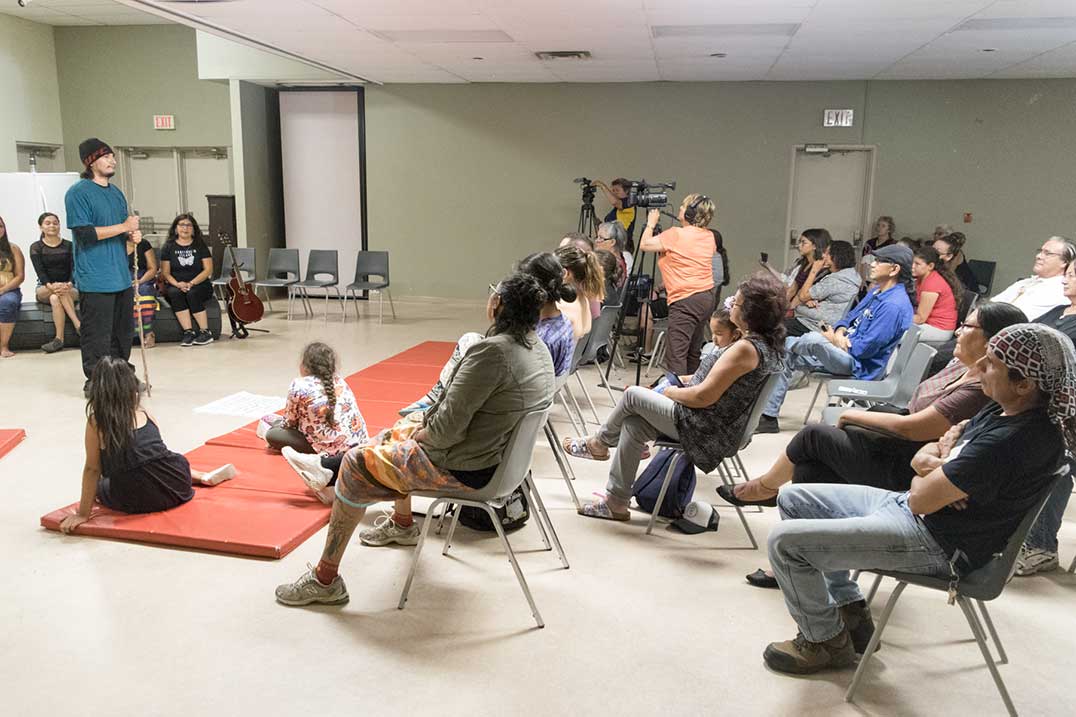Week-long theatre workshop provides training, both dramatic and cultural
AUNDECK OMNI KANING—The Centre for Indigenous Theatre (CIT)’s Giving Justice a Voice project brought tears, hugs, laughter and beaming smiles to the Aundeck Omni Kaning (AOK) Community Centre during its final performance Friday, July 27.
“I’m not really an emotional kind of guy, but there were a lot of emotions. I was mainly happy,” said participant Franklin Assiniwe. “Really happy.”
Giving Justice a Voice was a youth initiative run through the CIT, in partnership with renowned playwright Alanis King. The week-long workshop culminated in a performance which brought out friends, family and community members to cheer on the participants.
Star Nahwegahbo, project coordinator for Giving Justice a Voice, is originally from AOK. She said the workshops provided a rich experience for the participants.
“We recruited around seven youth from different First Nations around the Island to participate in learning some theatrical skills, but also talking about justice and alternative ways of justice,” said Ms. Nahwegahbo.

Drama therapy is growing in popularity as a way of getting participants to expand their comfort zones and find their voices in a safe space that fosters creativity. It can also be tailored to resonate more with participants, as Ms. Nahwegahbo did by including land-based knowledge and cultural teaching within the workshops.
“The group has been working together, sharing stories of resiliency, a lot of challenges and obstacles we face within our community, intergenerational trauma, and also resilience and trying to provide a better life for our children,” she said.
Cree Trudeau from Wiikwemkoong said she had never participated in anything like this before, and that it was an enriching experience. “The best part was coming out of my shell and learning more about myself that I didn’t know, like the talent and certain things that I didn’t even know that I had,” she said.
To explore different meanings of justice, Ms. Nahwegahbo collaborated with the United Chiefs and Councils of Manitoulin (UCCM) Anishinaabe Police force to highlight its restorative justice programs. Among its many aspects, restorative justice involves the use of a diversion program to keep youth away from the criminal justice system, and healing circles, both of which were discussed in the workshops.
“Throwing people into prison isn’t a great solution, so we’re looking at how to take care of the whole community when that happens,” said Ms. Nahwegahbo.

Giving Justice a Voice started at CIT in Toronto. Following two weeks of training there for the artists travelling with the production, the small team took the show on the road. Their first stop was in Thunder Bay for one week, followed by another week on Manitoulin for workshops and a final performance at the AOK community centre.
In addition to Ms. King, participants also received expert instruction and feedback from actress Gloria May Eshkibok. Both are from Wiikwemkoong, and Ms. King was the first Indigenous woman to graduate from the National Theatre School of Canada. She has written and directed a number of theatrical productions since she began her career in the mid-1980s.
Ms. Trudeau said the experience grew her knowledge of theatre as an entire industry. “It really opened my eyes to seeing the different aspects on both sides, even what Star’s doing, getting everything coordinated,” she said.
Mr. Assiniwe expressed how thankful he was to have participated in the program.
“It was one of the better things that I’ve tried in my life,” he said. “It was safe, it was fun, a lot of laughs, there were a lot of tears, and I’m going to remember this for the rest of my life.”




